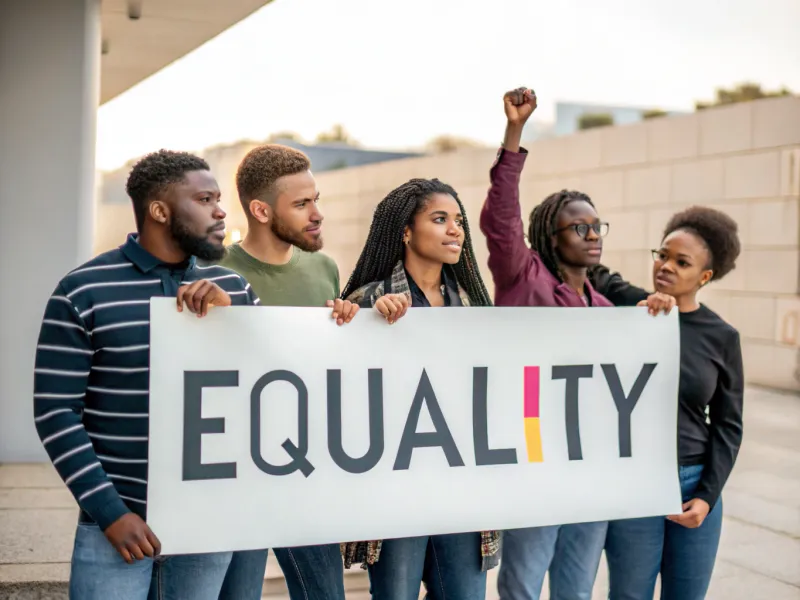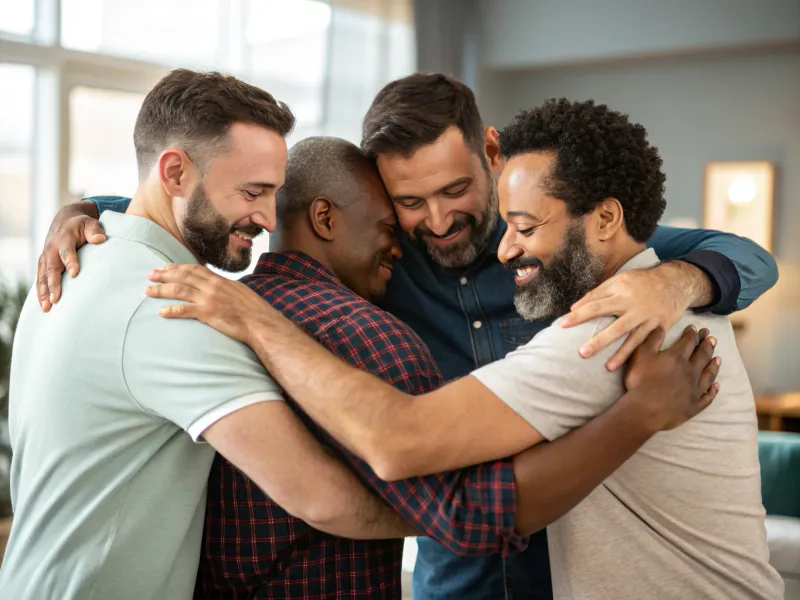13 Facts About Feminism and 17 Ways It Challenges the ‘Boys Will Be Boys’ Mentality in Popular Culture
For decades, “boys will be boys” has been used as a blanket excuse to justify everything from playground fights to toxic behavior in adulthood. It’s often code for “we don’t expect more from men, and we’re not going to hold them accountable.”
Feminism flips that script. Not because it’s anti-male—but because it believes men are capable of more. More emotional depth. More respect. More accountability. More humanity.
Here are 30 facts about feminism—and how it challenges the damaging “boys will be boys” mindset embedded in pop culture, classrooms, locker rooms, and beyond.
1. Feminism is about equality—not female superiority.

Feminism isn’t about flipping the power. It’s about sharing it. Equality means everyone gets a chance at the table, regardless of gender. This philosophy challenges the idea that power must be hoarded or dominated by one gender.
By promoting equal opportunities for all, feminism opens the door for genuine collaboration and mutual respect. It fosters environments where voices can be heard equally, nurturing a culture that thrives on diversity and inclusiveness.
It encourages respect, empathy, and understanding, elements often missing in a “boys will be boys” culture that excuses poor behavior as a natural trait. Feminism seeks to replace outdated stereotypes with a balanced power dynamic, where everyone can contribute to society’s progress without fear of being overshadowed or suppressed.
2. Feminism challenges rigid gender roles—for everyone.

Because “real men don’t cry” and “good girls don’t speak up” are lies. Feminism shatters these stereotypes by advocating for freedom of expression, irrespective of gender. These roles, often reinforced from a young age, can limit personal growth and potential.
By challenging these norms, feminism encourages individuals to explore interests and emotions without fear of judgment or ridicule. It allows for a society where boys can openly express vulnerability and girls can voice their opinions without backlash.
This shift empowers both men and women to embrace their true selves, fostering relationships built on authenticity rather than societal expectations. In doing so, feminism not only liberates but also enriches lives by promoting genuine self-discovery and acceptance.
3. It encourages emotional expression in all genders.

Tears aren’t weakness. They’re human. Feminism advocates for a world where emotional expression is a strength, not a flaw. In a culture that often mocks or dismisses male vulnerability as a sign of weakness, feminism offers a refreshing perspective.
It recognizes the importance of emotional literacy as essential to mental health and well-being. Encouraging all genders to express emotions freely fosters a more empathetic and understanding society. By challenging the notion that emotions are exclusive to femininity, feminism helps dismantle toxic masculinity that praises stoicism over sensitivity.
This shift not only benefits personal health but also enhances interpersonal relationships, enabling deeper connections and mutual support. By embracing emotions, feminism nurtures a world where we all feel safe to be ourselves.
4. Feminism promotes healthy masculinity—not toxic dominance.

You can be strong without being controlling. Feminism redefines masculinity by promoting qualities like kindness, empathy, and integrity over aggression and dominance. It challenges the notion that masculinity must equate to control and power, offering instead a vision of strength rooted in compassion and respect for others.
By rejecting toxic traits, feminism advocates for a masculinity that embraces vulnerability and cooperation. This healthier version of masculinity encourages men to build meaningful relationships, grounded in trust and mutual respect.
It empowers men to reject harmful stereotypes and embrace a version of themselves that contributes positively to society. Feminism calls for a world where masculinity is not about overpowering others but uplifting everyone through genuine human connection and understanding.
5. It calls out systems—not individuals.

Feminism critiques the culture that enables harm, not every man who exists. It’s about addressing the systemic roots of inequality rather than singling out individuals for blame. By focusing on patterns and structures, feminism seeks to dismantle the societal norms that perpetuate harmful behaviors and attitudes.
This approach encourages collective responsibility and societal change, rather than personal attacks. By understanding and addressing these broader systems, feminism aims to create environments where everyone can thrive without prejudice or discrimination.
It promotes collaboration and empathy, urging society to work together toward a more equitable future. By calling out systems, feminism encourages us all to be vigilant and proactive in challenging unjust practices and creating a world where fairness and equality are the norms.
6. It holds space for male survivors of abuse.

Feminism believes men deserve healing and support too. In a world where male vulnerability is often stigmatized, feminism stands as an ally, advocating for spaces where male survivors of abuse can seek help without shame. It recognizes that abuse knows no gender and that everyone deserves compassion and support.
By acknowledging the struggles of male survivors, feminism fosters a more inclusive and empathetic society. It challenges the notion that men must always be strong and impervious to harm, promoting a culture of healing and recovery.
By holding space for male survivors, feminism encourages open dialogue about abuse, reducing stigma and promoting a supportive network where individuals can heal and reclaim their lives. This approach not only aids recovery but also strengthens community bonds.
7. It includes all genders and identities.

It’s not just for straight cis women—it’s for everyone harmed by patriarchy. Feminism embraces diversity by advocating for the rights and representation of all genders and identities. It seeks to dismantle the barriers that marginalize certain communities, promoting inclusivity and equality for every individual.
By acknowledging the unique challenges faced by different identities, feminism strives to create an environment where everyone feels seen, heard, and valued. This inclusivity is crucial in challenging the “boys will be boys” mentality that often excludes or discriminates against non-conforming identities.
By advocating for all, feminism paves the way for a more harmonious society where diversity is celebrated and everyone can thrive. It encourages unity and solidarity, fostering a community where love and acceptance reign.
8. Feminism uplifts consent, communication, and mutual respect.

Because boundaries are basic—not optional. Feminism champions the critical importance of consent and healthy communication in all interactions. By promoting these values, feminism challenges the “boys will be boys” mentality that often excuses disrespectful or harmful behavior.
It emphasizes the necessity of mutual respect and the active practice of listening and understanding each other’s boundaries. This approach fosters environments where individuals feel safe and respected, encouraging healthier relationships and interactions.
In advocating for consent and communication, feminism empowers individuals to take control of their own narratives, promoting personal agency and autonomy. By uplifting these values, feminism lays the foundation for a society where respect and understanding are paramount, creating a world where everyone’s voice matters.
9. It challenges power imbalances in relationships.

Partnerships thrive when they’re based on respect—not control. Feminism calls for relationships where power is shared rather than wielded by one partner over the other. By addressing power imbalances, feminism encourages mutual respect and collaboration in relationships, fostering environments where both partners feel valued and heard.
This dynamic challenges the “boys will be boys” mentality that often normalizes control and dominance in relationships. By promoting equality, feminism advocates for partnerships built on trust, communication, and shared responsibility.
It empowers individuals to recognize and challenge unhealthy dynamics, enabling them to build stronger, more fulfilling relationships. By addressing these imbalances, feminism supports a world where love and respect are the cornerstones of all interactions, leading to healthier and more harmonious connections.
10. Feminism educates, not cancels.

It encourages learning, growth, and calling people in. Feminism embraces a culture of education rather than cancellation, advocating for open dialogue and understanding. By fostering an environment of learning, feminism encourages individuals to grow and evolve in their perspectives.
It challenges the “boys will be boys” mindset by promoting accountability and responsibility rather than dismissal. Through education, feminism empowers individuals to recognize harmful patterns and work toward positive change. By calling people in, feminism promotes constructive conversations that lead to greater understanding and empathy.
This approach not only educates but also builds bridges, enabling collaboration and unity in the fight for equality. By prioritizing education over cancellation, feminism paves the way for a more informed and compassionate society.
11. It helps raise boys to be emotionally literate humans.

Not ticking time bombs of repressed anger. Feminism advocates for teaching boys emotional literacy from a young age, challenging stereotypes that expect boys to suppress their feelings. By promoting emotional education, feminism empowers boys to express themselves openly and healthily.
This approach challenges the “boys will be boys” mentality that often dismisses boys’ emotions as irrelevant or unnecessary. By nurturing emotional intelligence, feminism fosters environments where boys can grow into empathetic and understanding individuals.
This not only benefits their personal development but also contributes to building respectful and compassionate communities. By raising emotionally literate boys, feminism lays the foundation for a future where all individuals can interact harmoniously, valuing each other’s feelings and experiences.
12. Feminism exposes the dangers of rape culture.

Which starts with excuses like “he couldn’t help himself.” Feminism actively challenges the narratives that excuse or downplay violence, emphasizing accountability and consent. By highlighting the dangers of rape culture, feminism seeks to dismantle the societal norms that perpetuate victim-blaming and minimize the severity of assault.
It addresses the “boys will be boys” mentality that often excuses harmful behavior as a natural male trait, advocating instead for responsibility and respect. By exposing these dangers, feminism promotes a culture where individuals are educated about consent and empowered to speak out against injustice.
This advocacy not only supports survivors but also works to prevent future harm by fostering environments where safety and respect are paramount. Feminism calls for a society where everyone can live without fear of violence or exploitation.
13. It redefines strength to include softness, empathy, and vulnerability.

These aren’t feminine traits—they’re human ones. Feminism broadens the definition of strength by embracing qualities like empathy, kindness, and vulnerability as integral to human character. By challenging the “boys will be boys” mentality that equates strength with dominance, feminism promotes a more inclusive understanding of what it means to be strong.
It encourages individuals to embrace their full range of emotions, recognizing that true strength lies in the ability to be authentic and compassionate. By redefining strength, feminism empowers individuals to challenge societal norms that limit personal expression and growth.
This approach fosters environments where diverse traits are celebrated, promoting a culture of acceptance and understanding. By valuing softness and vulnerability, feminism paves the way for a world where everyone can be their true selves without fear of judgment or ridicule.
14. Feminism demands accountability—not perfection.

Growth is allowed. Excuses are not. Feminism advocates for a culture where individuals are held accountable for their actions, fostering environments of growth and learning. By emphasizing responsibility, feminism challenges the “boys will be boys” mentality that often excuses poor behavior. It encourages individuals to take ownership of their actions and work toward positive change.
This approach not only promotes personal development but also contributes to building a society where accountability is valued over excuses. By demanding accountability, feminism empowers individuals to recognize their impact on others and strive for continuous improvement.
This fosters a culture of integrity, where individuals are encouraged to learn from their mistakes and grow into more empathetic and understanding members of society. By prioritizing accountability, feminism supports a world where positive change is possible.
15. It works to make the world safer, kinder, and more equal—for everyone.

Because when equality rises, we all win. Feminism advocates for a world where safety, kindness, and equality are the norms, creating environments where everyone can thrive without fear of discrimination or harm. By challenging the “boys will be boys” mentality that often normalizes aggression and inequality, feminism promotes a vision of society where respect and compassion are paramount.
This not only benefits women but also creates safer and more inclusive spaces for all individuals. By working toward equality, feminism empowers communities to collaborate and support each other, fostering a culture of mutual respect and understanding.
This approach encourages individuals to recognize their shared humanity and work together toward a more harmonious future. By prioritizing equality and kindness, feminism paves the way for a world where everyone can live with dignity and respect.
16. It calls out media that romanticizes bad behavior.

Aggression isn’t hot. Emotional unavailability isn’t mysterious—it’s unhealthy. Feminism critiques media portrayals that romanticize harmful behaviors, challenging narratives that excuse or glorify toxicity. By calling out these portrayals, feminism advocates for media that reflects healthy, respectful relationships.
It encourages a shift away from narratives that normalize aggression or emotional unavailability as desirable traits. This approach promotes media representation that values mutual respect, communication, and empathy over control and manipulation.
By challenging harmful media portrayals, feminism empowers individuals to recognize and reject toxic patterns, fostering a culture of healthy relationships and interactions. This supports individual well-being but also contributes to creating a more informed and conscious society.
17. It critiques movies and shows that normalize harassment as flirting.

No means no—even if she says it with a smile. Feminism challenges the normalization of harassment in media, advocating for depictions that uphold respect and consent. By critiquing movies and shows that blur the lines between harassment and flirtation, feminism seeks to dismantle narratives that excuse inappropriate behavior as romantic or playful.
This advocacy promotes media that upholds the importance of consent and boundaries, encouraging audiences to recognize and challenge harmful portrayals. By critiquing these narratives, feminism empowers individuals to demand media that respects and values individuals’ autonomy.
By prioritizing respectful media portrayals, feminism promotes a world where everyone’s dignity and boundaries are honored.
18. It questions why “locker room talk” is tolerated.

Misogynistic jokes aren’t harmless. They shape beliefs. Feminism challenges the normalization of “locker room talk,” advocating for environments where respect and understanding are paramount. By questioning why such talk is tolerated, feminism seeks to dismantle the harmful narratives that excuse disrespectful or misogynistic language as harmless banter.
This advocacy promotes a culture of accountability and respect, emphasizing the importance of communication that uplifts rather than degrades. By addressing this issue, feminism empowers individuals to challenge harmful language and behavior, fostering environments where everyone feels valued and respected.
Feminism supports a world where everyone can engage in dialogue without fear of judgment or ridicule.
19. Feminism demands better male role models in entertainment.

Not just heroes who punch hard—but ones who feel, grow, and apologize. Feminism calls for male role models in media who embody qualities like empathy, vulnerability, and accountability. By demanding better representation, feminism challenges the “boys will be boys” mentality that often glorifies aggression as a desirable trait.
By encouraging diverse portrayals of masculinity, feminism empowers individuals to recognize and embrace a broader spectrum of male identities.
Feminism supports a world where everyone can see themselves represented in a positive and empowering light.
20. It unpacks how male violence is glorified.

Real strength doesn’t have to be violent. Emotional control is power too. Feminism challenges the glorification of male violence in media, advocating for portrayals that celebrate peaceful and constructive behaviors.
By unpacking how violence is often depicted as a desirable trait, feminism seeks to promote narratives that value emotional intelligence and conflict resolution. It encourages media to reflect and inspire healthier expressions of masculinity, where strength is defined by empathy and understanding rather than aggression.
Feminism empowers individuals to reject harmful stereotypes and embrace peaceful interactions.
21. It challenges “bro culture” that rewards cruelty and dominance.

Being a jerk doesn’t make you a man. It makes you dangerous. Feminism critiques “bro culture” by challenging the norms that reward cruelty and dominance as signs of masculinity. By addressing these harmful narratives, feminism seeks to dismantle the culture that excuses poor behavior as a rite of passage for men.
By challenging “bro culture,” feminism empowers individuals to embrace healthier expressions of masculinity, fostering environments where everyone feels valued and respected.
Feminism wants a world where everyone can thrive without fear of judgment or ridicule.
22. It pushes back against blaming women for male behavior.

What she wore. What she drank. Where she was. Irrelevant. Feminism pushes back against narratives that blame women for male behavior, advocating for accountability and responsibility. By challenging these harmful narratives, feminism seeks to dismantle the culture that excuses male behavior by shifting blame onto women.
By pushing back against victim-blaming, feminism empowers individuals to recognize and challenge harmful narratives, fostering environments where everyone feels valued and respected.
This approach contributes to creating a society where respect and understanding are the norms.
23. It promotes respectful dating norms, not manipulative ones.

Ignore her to make her want you? No. Just no. Feminism advocates for dating norms that prioritize respect, communication, and consent over manipulation and control. By challenging manipulative behaviors, feminism seeks to promote healthy and respectful interactions in dating and relationships.
This promotes respectful dating norms, and a culture where trust and communication are the foundations of all interactions.
Feminism supports a world where everyone can engage in relationships that are positive and empowering, free from fear or manipulation.
24. It calls out music, ads, and brands that objectify women.

Women aren’t props. They’re people. Feminism challenges the objectification of women in media, advocating for representations that respect and value women’s autonomy. By calling out music, ads, and brands that objectify women, feminism seeks to dismantle the culture that reduces women to mere objects.
By challenging objectification, feminism empowers individuals to recognize and reject harmful narratives, contributing to creating a society where respect and understanding are the norms.
Feminism supports a world where women’s voices and experiences are valued and celebrated.
25. Feminism says masculinity doesn’t have to be fragile.

If kindness threatens it, it was never strong to begin with. Feminism challenges the idea that masculinity must be fragile, advocating for a version of masculinity that embraces qualities like empathy, vulnerability, and kindness.
By rejecting the notion that masculinity must be rigid or unyielding, feminism promotes a more inclusive understanding of what it means to be masculine.
Feminism wants a world where everyone can thrive without fear of judgment or ridicule.
26. It breaks the myth that “boys are naturally aggressive.”

Nope. That’s social conditioning—not biology. Feminism challenges the myth that boys are naturally aggressive, advocating for an understanding of behavior shaped by social and cultural influences.
By addressing this stereotype, feminism seeks to promote environments where boys can express themselves freely without conforming to harmful norms.
This advocacy empowers individuals to recognize and reject narratives that excuse poor behavior as a natural male trait. By breaking the myth of natural aggression, feminism supports a world where everyone can thrive in a safe and respectful environment.
27. It encourages boys to be accountable without being shamed.

You can be taught better and still be lovable. Feminism encourages accountability over shame, advocating for environments where boys can learn and grow without fear of judgment. By promoting a culture of responsibility, feminism seeks to challenge the “boys will be boys” mentality that excuses poor behavior.
This advocacy empowers individuals to recognize and embrace opportunities for growth and improvement, fostering environments where everyone feels valued and respected.
By encouraging accountability without shame, feminism supports a culture where everyone can thrive in a safe and respectful environment, free from fear or judgment.
28. It shines a light on how media handles male trauma.

Men cry too. And they deserve support—not mockery. Feminism challenges the portrayal of male trauma in media, advocating for narratives that recognize and support male vulnerability.
By highlighting the importance of empathy and understanding, feminism seeks to dismantle the stigma that often surrounds male emotion.
This advocacy shines a light on male trauma and supports a world where everyone can thrive in a safe and respectful environment.
29. It supports men who speak up against misogyny.

Feminist men aren’t “soft”—they’re strong enough to lead differently. Feminism supports men who challenge misogyny, advocating for environments where everyone can contribute to positive change.
By encouraging men to speak up against injustice, feminism seeks to dismantle the culture that excuses or normalizes harmful behavior. This empowers individuals to recognize and embrace opportunities for growth and improvement.
By supporting men who speak up, feminism promotes a culture where diverse expressions of identity are celebrated, everyone can thrive in a safe and respectful environment, free from fear or judgment.
30. It calls for media that reflects real men—not just stereotypes.

Complex. Caring. Honest. Flawed. Human. Feminism calls for media that reflects the full spectrum of male identity, challenging stereotypes that limit portrayals of masculinity.
By advocating for diverse and authentic representations, feminism seeks to dismantle the culture that reduces men to one-dimensional characters. This empowers individuals to recognize and embrace diverse expressions of identity.
Feminism supports a culture where diverse expressions of identity are celebrated, contributing to creating a society where respect and understanding are the norms.







